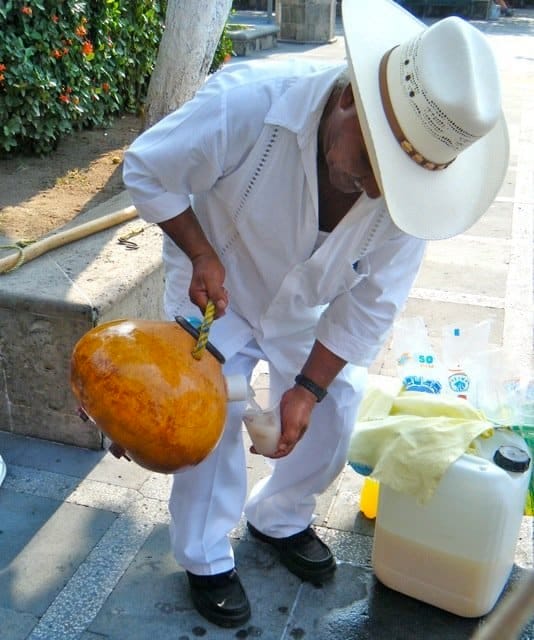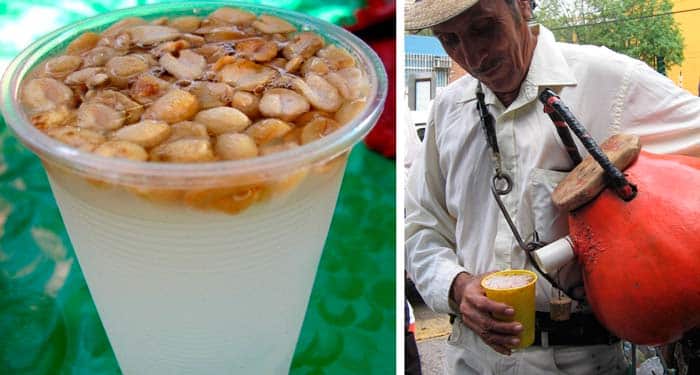
Tuba Drink: Exploring the Richness of This Mexican Palm Elixir
The tuba drink is a traditional craft beverage that gives character to the state of Colima Mexico.
However, this tropical “elixir” is still unknown to many visitors.
Tuba is a unique drink brought to Mexico from the Philippines by the Manila Galleon in the 16th century.
The tuba is extracted from coconut palms with a soft flavor and pink color, usually sold in downtown markets.
The “tuberos” (people who produce tuba) carry on their shoulders special containers known as “bule,” or “balsa,” which contain and keep the tuba drink fresh and cool.
When served, it is garnished with diced fruit, nuts and peanuts.
Again, the tuba is a traditional drink from the Pacific coasts of Mexico (very popular in Puerto Vallarta), adapted to the lands of the American continent since its arrival from the Philippines.
However, it did not arrive in liquid form but as a fruit.
Tuba History

On the great ship, also known as the Manila Galleon, coconuts dried up upon arrival when not used as a water source.
These dried coconuts sprouted plants, which were preserved by the people in the hope that they would thrive on New Spain soil.
The name “tuba”, also of Filipino origin, refers to the sap of the coconut palm.
It is believed that the first place where there was a coconut palm was in the now state of Colima.
It was thanks to the Filipino slaves brought by the Spaniards for the production of sugar cane and rice.
Who learned about the use and exploitation of the plant and its multiple derivatives.
How is the Tuba Drink made?
Tuba is a fermented beverage made from the nectar or sap of the inflorescences of the coconut palm, to which no external yeast is added.
It is considered a natural fermentation since its elaboration is handmade in most regions where it is produced.
To access the nectar, a cut must be made at the base of the inflorescences where the fruits would develop.
It is possible to bend the so-called stems and place them horizontally with the tiny cut.
You may want to read: Pulque Guide: Everything You Should Know
Subsequently, another cut is made at the tip of the inflorescence, through which the sap will drip into a container that is tied to collect the liquid.
This is done twice a day for approximately 10 to 15 days, during which the palm produces the precious nectar.
The liquid collected in the morning is called sweet tuba. It is viscous in appearance, transparent in color, and has a very sweet flavor. Hence it is also known as mead.
Its useful life with these characteristics is about five hours because it soon begins the natural fermentation process.
Process

On the other hand, the tuba obtained in the afternoon has a lighter consistency and a less sweet flavor; these characteristics are determined mainly by the time it is exposed to the heat.
Those in charge of the arduous task of extracting this elixir are called tuberos, who daily climb up to the tops of the palms and descend with the help of a rope or the more modern ones with a ladder.
You may want to read: Comiteco, an Agave Spirit from Comitan Chiapas
But the process doesn’t end when it’s harvested; the tuberos boil the drink to stop the fermentation and add different ingredients such as apple, peanut, walnut, or pulp of some other fruits.
The production and sale of tuba is a typical activity in several regions of the Pacific coast, mainly in the states of Colima and Guerrero, Jalisco, Michoacán, and Oaxaca.
This drink is an integral part of Mexican culture and tradition, thanks to the Filipino heritage.